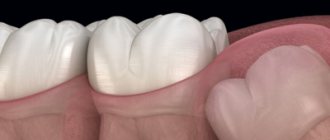Representatives of the fair sex are especially careful about the beauty of their smile. Daily oral hygiene, timely treatment of caries, professional cleaning, whitening, dental restoration, and other dental procedures help maintain the health and aesthetics of the dental system. However, even careful care does not guarantee the loss of teeth. If this happens, then implantation is the best way to restore the dentition. However, this method is associated with some difficulties due to the characteristics of the female body, especially during menstruation or pregnancy.
Implantation during “critical days”: why doctors are against
When asked whether it is possible to place an implant during menstruation, any highly professional specialist will answer that this cannot be done. Moreover, the doctor is simply obliged, even at the stage of collecting anamnesis, preparing and working out a treatment plan, to ask the patient all the delicate questions: the date of the next menstruation, whether the woman is planning a pregnancy or IVF, whether she is pregnant or is breastfeeding for a given period of time. Obtaining detailed and truthful information on this matter is equally important both for the specialist and for the health and well-being of the patient herself.
Do not forget that dental implantation is a procedure that involves violating the integrity of living tissues of the body. Even though modern technologies allow it to be carried out taking into account the slightest individual characteristics of the patient, with preliminary preparation and 3D modeling of the treatment process, to eliminate risks and to do it minimally invasively. But, like any intervention, implantation has a number of absolute and relative contraindications. In absolute cases, treatment cannot be carried out in principle: tuberculosis, poor blood clotting, renal and liver failure, the presence of malignant tumors, autoimmune diseases.
For relative cases, which also include menstruation, the procedure is simply postponed until the contraindications are eliminated. This also includes a lack of jaw bone tissue, pregnancy and breastfeeding, planning pregnancy and IVF, the presence of cysts and granulomas, insufficient sanitation of the oral cavity, weakened immunity and the presence of diseases in the acute stage.
Signs and symptoms of implantation bleeding
After ovulation, the female body actively prepares for the birth of a new life. The uterine cavity is covered with endometrium, to which the fertilized egg must attach. If fertilization does not occur, the endometrium leaves the uterus during menstruation. Otherwise, the fertilized egg is implanted into the mucous membrane. The endometrium has a loose structure equipped with capillaries. During the process of attachment of the zygote, the capillaries may be damaged. As a result, a small amount of blood fluid comes out. When this process coincides with menstruation, a woman may confuse her period with pregnancy.
When you can and when you can’t start installing implants
Dental implantation is not performed during menstruation. Doctors also recommend postponing it if you plan to have your period in the next 3-5 days. It is during this period of time that active hormonal changes in the body occur, metabolism decreases, and the number of red blood cells and hemoglobin in the blood jumps sharply (immediately after the start of menstruation, these indicators, on the contrary, sharply decline). Also, under the influence of hormones, a large number of toxins accumulate in the body, the outflow of fluid becomes difficult, blood sugar levels decrease, and hormonal imbalance occurs. Against this background, the woman manifests a stressful, depressed state, and mood swings.
At the end of menstruation, it is advisable to wait 3-5 days for the female body to recover. And already then you can safely begin to restore dental defects.
In 60% of all women, the menstrual cycle is 28 days, the duration of “critical days” ranges from 2 to 7. The body loses up to 40 milliliters of blood per day, up to 150 milliliters over the entire period, which significantly weakens its protective functions and reactions.
Menstruation and dental implantation: what doctors say
When planning an operation, the dentist asks the woman about the date of her critical days. If they fall on the date of installation of the implants, the doctor reschedules the treatment. The procedure is prescribed a few days, or better yet, a week before the start of menstruation. That is, it is contraindicated during menstruation.
This restriction applies to any surgical intervention unless it is an emergency. This is due to the fact that tissues are injured and for their restoration the body must be in a stable state. During menstruation, the stability of many systems of the female body is disrupted, which means health complications may arise.
Any doctor will refuse implantation to a patient if she is having her period during her period.
What happens to a woman's body during menstruation
During this difficult period for a woman, her body experiences stress, her immunity decreases, and the following changes occur that can significantly affect her well-being during dental implantation:
- the pain threshold increases: this means that even minor injuries can seem very painful. And analgesics and even strong anesthesia may simply be ineffective during this period. For example, it is also not recommended to remove teeth during menstruation (although with one-step implantation methods, two procedures can be carried out simultaneously), because in this state a woman can simply lose consciousness from pain shock. Even though the procedure is not actually that painful, and when anesthesia is used, it generally takes place without any discomfort,
- it is difficult to relieve pain after surgery: even if the procedure was successful, after the intervention you cannot avoid the body’s natural reaction and pain, and pills may not cope,
- blood clotting is impaired: during this period, the number of platelets in a woman’s blood sharply decreases (by 40-60% compared to the norm), which are precisely responsible for good blood clotting after any surgical interventions. This mechanism is programmed by nature and allows you to avoid the occurrence of blood clots, blockage of blood vessels, and the formation of clots in internal organs during “critical days”,
- immunity sharply decreases and at the same time the risk of contracting an infection increases. He will accompany you both during the installation of implants, if sterility was violated, and during the rehabilitation period. Indeed, in such conditions, the entry of even a small number of pathogenic bacteria into the wound can result in severe infectious inflammation, suppuration, peri-implantitis,
- Blood pressure drops: against this background, headaches and malaise occur.
Causes of discharge
After fertilization, the blastocyst seeks a place for attachment in order to further form the chorion, and then the placenta. Every month, the endometrium inside the uterine cavity prepares for the upcoming event. In cases where conception still does not occur, its upper layers peel off and come out along with menstrual blood.
When pregnancy has occurred, the endometrium, loose and full-blooded, is ready for implantation of the blastocyst and accepts it. The developing embryo secretes special enzymes that “dissolve” the attachment site deeper. As a result, the integrity of the vascular wall is compromised, mostly in the capillaries. As a result, a small amount of blood is released from the uterine cavity through the cervix to the outside.
What complications may arise during and after implantation?
The menstrual cycle, namely the moment of menstruation itself, and the installation of implants should not be combined. This can lead to unpleasant consequences.
Does the chosen implantation method affect contraindications? The least number of contraindications exist for one-stage implantation options with immediate loading, when the installation of implants and fixation of the prosthesis takes place in the shortest possible time. The greatest is a two-stage treatment with delayed loading, when the treatment process is extended over months. But in both cases, it is not recommended to install the implant during the “critical days”. Also, other related operations that require surgical intervention cannot be performed: sinus lifting or bone tissue augmentation, gum grafting.
The following are complications that may occur if surgery is performed against the background of hormonal changes. Of course, they are rare. Plus, a competent specialist will conduct training, that is, he will definitely assess the patient’s health condition.
Development of bleeding
During her critical days, a woman already loses blood. And when a doctor performs the procedure for installing implants, even if he does it in the most minimally invasive way, by puncture and through special surgical templates, the specialist still affects the mucous membrane, gums, and affects capillaries and blood vessels. But the danger is not even this, but the fact that platelet production is disrupted during menstruation. Simply put, when the capillaries are damaged, the blood becomes less able to clot, which can develop into serious, severe and unstoppable bleeding.
With complications, a woman can lose more than 500 milliliters of blood, and this condition requires urgent hospitalization.
Blood clots
As mentioned above, malfunctions in the hematopoietic system and blood clotting can lead to significant blood loss. But given the individual characteristics of the body, the exact opposite situation can also happen: cuts on the mucous membrane, disruption of the integrity of soft and hard tissues can contribute to increased activation of blood clotting factors. In this case, the resulting clots, or blood clots in other words, can “get stuck” directly in the vessels, preventing the flow of oxygen and nutrients to the organs. Then complications can occur in the heart, brain, lungs and other vital organs.
Formation of intraosseous hematoma
It is continuous bleeding that can become a risk factor for the development of this complication. The release of blood in the area where the implant comes into contact with the jaw bone is especially dangerous. Because It is here that, in an unfavorable environment, fibrous tissue begins to actively form, which prevents the implant from firmly merging with the bone. What consequences will this lead to? The implant will begin to wobble and shift. Moreover, at a doctor's appointment, palpation will reveal that it is rotating inside, and it will only be possible to remove it with surgical intervention.
Implant rejection
Hormonal imbalance during menstruation also affects a woman’s mental state. During this period of time, she is susceptible to stress and nervous overexcitability. The body’s protective functions are also suppressed; accordingly, the most critical period after the installation of implants – the first days – will be complicated by more intense pain, and the tissue will take longer to heal than in a normal situation. The risk of infection also increases. Against the background of reduced immunity, this may result in implant rejection.
Of course, such complications do not occur in all women and they can occur in a mild form. But still, it’s better not to take risks, even if you spend the period of “critical days” easily and without much discomfort. Wait a couple of weeks and, together with your doctor, choose a date for surgery that will be as safe as possible for you.
Author: Dzhutova A. V. (Thank you for your help in writing the article and the information provided)
Briefly about implantation
This is a dental operation to implant artificial roots in place of lost teeth. Implants are installed using two-stage and one-stage treatment protocols. The classic method involves the implantation of titanium rods in two stages: first, installation of an implant, and six months later, prosthetics with crowns.
One-step protocols allow the installation of artificial roots with immediate loading of the prostheses. Treatment takes only a few days. These technologies are used simultaneously with the removal of a dental unit (simultaneous implantation), the loss of several elements, or in the complete absence of teeth (zygomatic, basal implantation, All-on-4 or All-on-6).
When do menstrual-like discharge still occur and what does it mean?
In most other cases, bleeding during early pregnancy (in the first trimester) is an alarming symptom.
For example, it may indicate that the placenta is located in the lower part of the uterus and blocks its internal os (this can be interpreted as a threat of termination of pregnancy).
In the second and third trimester, the appearance of bloody discharge may indicate uterine rupture (for example, it can occur if there is a scar on the uterus after a previous birth), premature abruption of a normally located placenta, and other problems.
Bleeding during pregnancy is a sure sign for the expectant mother that she urgently needs to see a doctor.
It is important to remember that periods during pregnancy are not normal. In case of any bleeding, the help of a specialist is needed in this case.
Opinion of gynecologists
Doctors say that bleeding during implantation does not pose any threat to health. It may coincide with menstruation, may even occur after menstruation, or may not occur at all. The main thing is to know the symptoms in order to distinguish it from pathological discharge, which requires special attention. If the latter occurs, you should immediately go to the doctor to avoid dangerous consequences.
How often do periods occur during pregnancy?
15–20% of pregnancies end in spontaneous abortion in the early stages.
However, it is important to understand that although bloody vaginal discharge against the background of a live intrauterine pregnancy is designated by doctors as a “threat of miscarriage,” in a large number of cases, despite the dire diagnosis, such a pregnancy is successfully carried to term. If an interruption does occur, in most cases (overwhelming) we are talking about genetic abnormalities of the fetus that are incompatible with life. Other reasons include infectious diseases in the early stages, hormonal imbalances, physical overload, and so on.
What conditions are implantation bleeding confused with?
You can confuse discharge with blood during pregnancy with:
- Menstruation, which should not occur during pregnancy. Menstrual bleeding is heavier and longer, accompanied by PMS, headache, abdominal discomfort and other unpleasant symptoms.
- With an ectopic pregnancy. With this complication, the general condition of the woman suffers, and she experiences severe abdominal pain, nausea, and vomiting. Pain appears in the shoulder and collarbone, caused by irritation of the phrenic nerve by spilled blood. The discharge is copious and may contain fragments of the membranes.
- With the beginning of a miscarriage. This happens when the embryo fails to implant in the uterus. The woman develops bloody smears, gradually turning into bleeding.
- With vaginitis caused by damage to the vagina by pathogenic flora. Infection of the vagina leads to inflammation of the mucous membrane and increased fragility of blood vessels.
- With contact bleeding, in which after sexual intercourse a small amount of blood appears, released from damaged vessels of the uterine cervix. This is a dangerous symptom, indicating serious pathologies of the cervix, including cancer. A distinctive feature of contact discharge is the appearance of spotting after only sexual intercourse or straining.
- Endometriosis - bleeding in this disease, accompanied by disruption of the uterine mucosa before menstruation, is profuse and painful.
Could spotting indicate an ectopic pregnancy?
An ectopic pregnancy is when a fertilized egg deviates from its intended path and implants in the wrong place - outside the uterine cavity.
The appearance of bloody discharge from the genital tract is not uncommon during an ectopic pregnancy. Unlike menstrual bleeding, they have a thicker consistency and darker color.
It should be remembered that in the early stages, the signs of ectopic (ectopic) pregnancy are very similar to the signs of normal pregnancy (delayed menstruation, swelling of the mammary glands, positive urinary pregnancy test).
Any suspicion of an ectopic pregnancy is an indication for emergency hospitalization, as this is a life-threatening condition.










